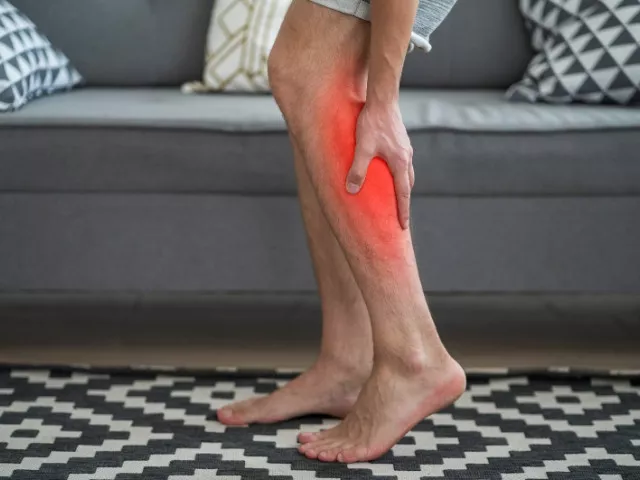Nighttime leg cramps can occur without any medical cause, but consulting a doctor is advisable to rule out any underlying issues. Stretching your calf and hamstring muscles before bedtime may help prevent these cramps.
Imagine you're lying down, and suddenly your lower leg tightens painfully. The intense pain can be overwhelming, making you feel paralyzed and helpless. Sound familiar?
According to American Family Physicians, nocturnal leg cramps affect up to 60% of adults. Often known as muscle spasms or charley horses, these cramps occur when leg muscles contract involuntarily.
The most commonly affected muscle is the gastrocnemius (calf muscle), which runs from the ankle to the knee at the back of the leg. However, cramps can also occur in the quadriceps (front thigh) and hamstrings (back thigh).
Leg cramps can strike whether you're awake or asleep, usually relaxing within 10 minutes. However, your leg may remain sore or tender for up to a day afterward. Frequent nocturnal leg cramps can disrupt sleep, particularly affecting women and older adults.
Causes of Nighttime Leg Cramps
While the exact cause of nighttime leg cramps is unknown, certain factors can increase your risk. Most cases are idiopathic, meaning their cause is not known.
Nighttime leg cramps may be related to foot position during sleep. When we sleep with our feet and toes pointing away from the body (plantar flexion), the calf muscles shorten, increasing the risk of cramping.
Other factors that may contribute include:
Sedentary lifestyle: Lack of regular muscle stretching can lead to cramping.
Muscle overexertion: Excessive exercise can overwork muscles, causing cramps.
Improper sitting position: Sitting with legs crossed or toes pointed for long periods can shorten calf muscles.
Prolonged standing: Standing for long periods can increase the likelihood of nocturnal leg cramps.
Abnormal nerve activity: Studies link leg cramps to increased, abnormal nerve firing.
Tendon shortening: Tendons naturally shorten over time, which can lead to muscle cramping.
While nocturnal leg cramps are rarely the first sign of a serious medical condition, they can be associated with pregnancy, structural issues (like flat feet or spinal stenosis), neurological disorders, musculoskeletal disorders, liver, kidney, and thyroid conditions, metabolic disorders, cardiovascular conditions, and certain medications (such as statins and diuretics).
Treating Leg and Calf Cramps
Although nighttime leg cramps can be intensely painful, they are typically not serious, and most people don’t require medical treatment. Here are some home remedies:
Massage: Gently knead and loosen the affected muscle.
Stretch: For calf cramps, straighten your leg and flex your foot so your toes point toward you.
Walk on your heels: This activates muscles opposite your calf, helping it relax.
Apply heat: Use a hot towel, water bottle, or heating pad, or take a warm bath or shower.
Drink pickle juice: Some evidence suggests it may help relieve muscle cramps.
Over-the-counter painkillers: NSAIDs like ibuprofen (Advil, Motrin) or naproxen (Aleve) can help relieve soreness after a cramp.
If cramps frequently disrupt your sleep, consult your doctor. They may prescribe a muscle relaxant or manage underlying conditions causing the cramps.
Preventing Nighttime Leg Cramps
To help avoid leg cramps while sleeping, consider these tips:
Stay hydrated: Drink plenty of fluids to support normal muscle function.
Stretch before bed: Stretching your calves and hamstrings can reduce cramps.
Ride a stationary bike: A few minutes of easy pedalling can loosen your leg muscles.
Change sleeping positions: Avoid positions where your feet point downward. Try sleeping on your back with a pillow behind your knees.
Use loose bedding: Avoid heavy or tucked-in bedding that pushes your feet downward.
Choose supportive footwear: Good footwear can prevent issues with nerves and muscles, especially if you have flat feet.
If you've experienced leg cramps at night, you know how painful they can be. Thankfully, they are usually not a sign of a serious problem. Stretching before bed and maintaining good hydration can help prevent nocturnal leg cramps.









COMMENTS (11)
Comments are moderated and generally will be posted if they are on-topic and not abusive.
For more information, please see our Comments FAQ